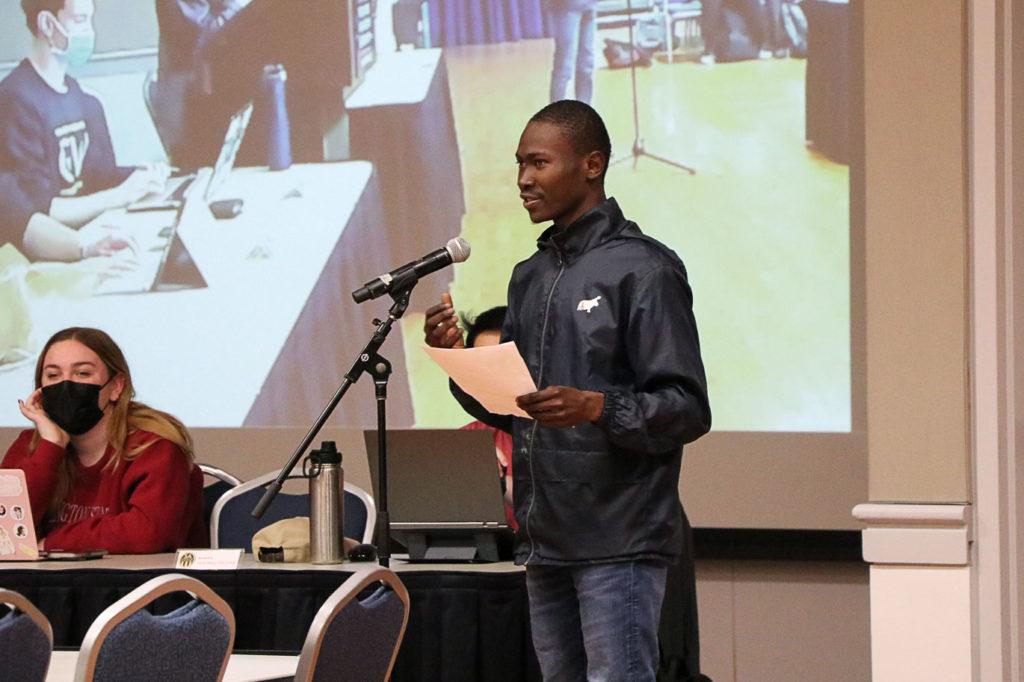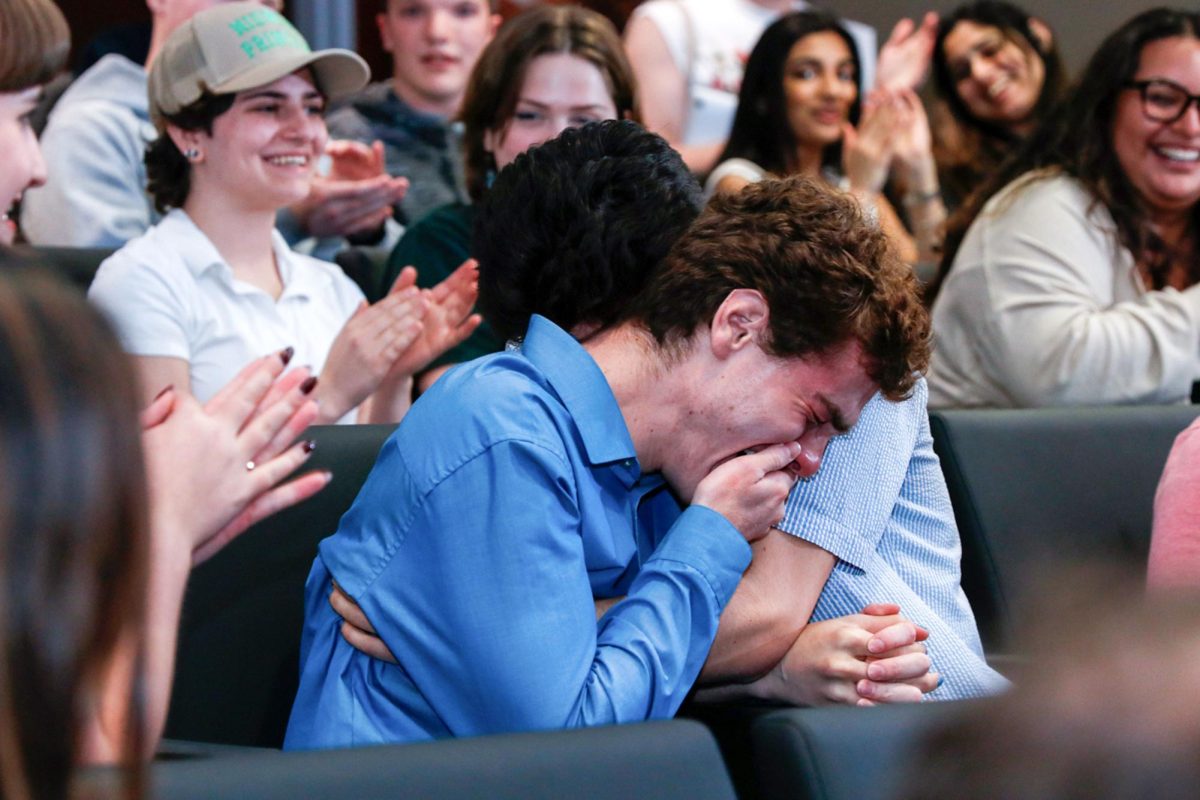The Student Association Senate passed 33 pieces of legislation last semester, filling vacancies, allocating finances and planning spring semester events – an uptick from the 26 legislative items passed during the previous fall.
Fourteen of the 33 bills that the senate passed last semester approved nominees to the executive cabinet, senate and other positions, like senate staff members and a Student Court justice. Among its other major legislative highlights, the senate distributed a total of more than $240,000 to nearly 300 student organizations for the spring’s general allocations and voted to organize a career fair in February.
After the senate approved 16 cabinet members since May, SA President Christian Zidouemba said he has completely filled his cabinet positions, with the exception of three vacancies that senators will consider at their next meeting Monday.
“My term overall started with trials and tribulations,” he said. “I started on the wrong foot.”
Following a presidential power struggle in July that began with an executive cabinet vote to remove Zidouemba, seven members of his cabinet resigned within the next two days. The senate confirmed senior Andrew Harding in late August to replace Zidouemba’s former legislator general, who stepped down during the wave of resignations.
Harding resigned in late October to pursue a full-time job, and Zidouemba nominated freshman Adam Galland, who previously served as the director of inventory in the executive branch, to replace Harding in December. Senators will vote on Galland along with the appointment of two other cabinet members at their meeting Monday.
“Overall, I’m satisfied with the cabinet members that I have and the people that I have,” Zidouemba said. “Because each and every one of them has different experiences and different skills that they bring to the table.”
Zidouemba said his cabinet spent the fall working on projects, like planning the installation of contraceptive vending machines and coordinating school spirit events, like Raise High Wednesdays, which feature weekly tabling in Kogan Plaza, and a midterm stress relief event, which Zidouemba said drew more than 3,000 students.
The senate filled each of its 47 seats for the first time since October 2017 last semester. The senate now must replace Alex Erickson, who represented the Graduate School of Education and Human Development, and Nate Safford, who represented graduate students in the Elliott School of International Affairs, after the pair graduated last semester.
The senate passed two resolutions of appreciation in late May for former Dean of Students Cissy Petty and former Executive Vice President and CFO Mark Diaz, who both left their positions last summer – largely symbolic gestures that thanked the former administrators for their service to the University.
Ten pieces of the senate’s passed legislation reformed the internal processes of the legislative body. The senate amended its bylaws to allow senators to hold multiple committee leadership positions and removed the requirement for the chairperson of the Sustainability Committee to be a member of the Physical Facilities and Urban Affairs Committee.
In its final meeting of the fall semester in December, the senate approved general student organization allocations for the spring, divvying up more than $240,000 among 296 student organizations.
The Senate Legal Counsel accused Ian Ching, the former chair of the Finance Committee, in November of delaying the allocations process by about two months and displaying preferential treatment toward select student organizations, like GWU Esports. In the previous year, the senate passed spring general allocations in mid-October.
Ching resigned three days after the report was published, and SA Sen. Linsi Goodin, CCAS-G, took his place as Finance Committee chair.
The senate published its internal budget for the first time in late August, totaling $12,750 for the current fiscal year. More than $7,000 funded town halls and meetings, and $4,000 covered food at senate meetings.
Vice President Yan Xu said the budget decreased from the previous year’s, which totaled $19,254.48.
Senators also passed the executive budget, which allocated the executive branch $29,450 to spend on events, payments to office staff and costs for subscription services. The senate confirmed the executive branch’s request in December to modify the budget to $29,950, remove funding for online subscription services and reallocate funding from the Cookout with the President to “all unexpected necessary costs,” providing flexibility so the executive branch could run events on short notice.
Senators approved $4,000 for the GW Career Exploration Expo, which will be held Feb. 9 through Feb. 11. The Center for Career Services last held a University-wide career fair in January 2019, according to the University calendar.
Senate Chairperson Pro Tempore Demetrius Apostolis, the executive director of the event’s planning committee, said between 80 and 90 employers will host exhibits during the fair’s second day. Apostolis said the expo will consist of a panel and a brunch with alumni during the other two days.
Apostolis said the planning committee booked the 3rd floor of the University Student Center for the fair.
Senators passed the Fairness Advocacy and Inclusion Reform Act in late November, which created the Commission on Student Equity and Advocacy, a group that will advise University offices like the Title IX Office, the Office for Student Rights and Responsibilities and the Office for Diversity, Equity and Community Engagement on how to assist with Title IX and discrimination cases. SA Sen. Henry Deng, CCAS-U, who sponsored the bill, said he is implementing feedback on the FAIR Act from meetings with University staff to maintain transparency.
Deng said he hopes the FAIR Act would increase collaboration between the SA and the University in an effort to increase the efficiency and rate of resolution of Title IX cases.
“We will have to continue to talk to them, to work with them, trying to make a way that can help the commission to actually get to work with each other,” he said.
Earlier that month, the senate passed another bill Deng sponsored called the Encouraging Advocacy Act, which allows SA members to form advocacy groups that create SA policy with the help of the general student body without any internal senate committee oversight.
“It just essentially is more of a simplistic and very simple procedure rather than going through some legislative process,” he said.
Deng said the legislation enabled senators to reestablish the graduate student caucus, which was originally established in fall 2020 but dissolved in fall 2021.
“It’s pretty easy for them to get things running pretty quick,” he said.








